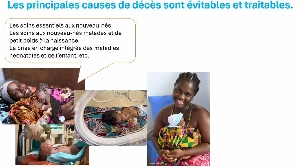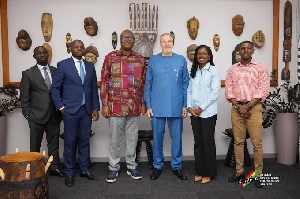Health News of Friday, 18 April 2025
Source: www.ghanawebbers.com
Expert calls for urgent investment in neonatal health in West and Central Africa
Prof. Faye Moctar, Vice President of the African Neonatal Association, has a message. He urges governments and health stakeholders in West and Central Africa to invest in neonatal care. This investment aims to reduce preventable newborn deaths.
He spoke during a webinar organized by REMAPSEN and UNICEF. Prof. Moctar highlighted that using evidence-based strategies can save lives. Specifically, he mentioned Kangaroo Mother Care (KMC) and Level 3 newborn care. These methods could potentially cut neonatal mortality by up to 40%.
The webinar focused on “Maternal, Neonatal and Child Health in West and Central Africa.” It gathered experts to review progress and discuss life-saving interventions.
Prof. Moctar championed KMC as an impactful yet underused strategy for neonatal survival. KMC involves holding newborns skin-to-skin on a parent’s chest.
He stressed that KMC should start immediately after birth, even if the baby is sick. “It is the right strategy,” he said, emphasizing its importance.
KMC is low-cost and helps reduce infections while improving breastfeeding. It also enhances emotional bonding between parents and their babies.
However, many parts of Africa have limited uptake of KMC due to training gaps and infrastructure issues.
The panel also addressed challenges related to Level 3 newborn care for critically ill or premature babies. Prof. Moctar noted that half of all pre-term babies in the region die from respiratory complications.
To combat this issue, he called for better-resourced neonatal intensive care units (NICUs). Modern equipment like ventilators and CPAP machines is essential.
He added that skilled personnel, adequate funding, and caring leadership are crucial for success.
Prof. Moctar emphasized involving families in neonatal care as well. He stated that parents should always be allowed near their child in the neonatal unit.
Their presence provides emotional healing and clinical benefits for the baby.
He advocated for structured counseling at discharge along with consistent follow-up support for families at home.
According to the panel, improving neonatal outcomes requires more financing and investment in essential equipment. Training healthcare professionals is also vital, along with political will and family involvement in care.
Professor Moctar stressed aligning national strategies with the Every Newborn Action Plan (ENAP).











